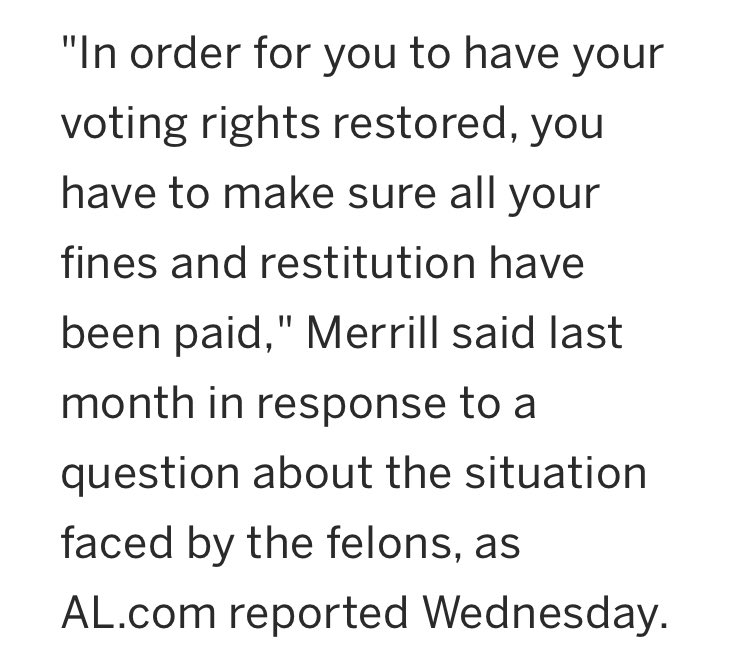While felon voting rights in Florida are back in the national news, I feel compelled to note that Alabama restored the franchise to thousands of felons burdened by fines and fees back in 2017, before it emerged as a major issue in Florida. A quick thread 1/
For years, Pastor Kenny Glasgow, himself a convicted felon, advocated for increased voting rights for Alabama felons and incarcerated individuals. He held protests, lobbied legislators and even helped people in jails register to vote 2/ https://www.al.com/news/2017/06/registering_to_vote_in_jail_ho.html">https://www.al.com/news/2017...
In May 2017, Gov. Kay Ivey signed a bill Glasgow had pushed for for years that defined what “moral turpitude” meant in an old Alabama law that barred people convicted of crimes “of moral turpitude” from voting. 3/ https://www.al.com/news/2017/05/gov_ivey_signs_bill_restoring.html">https://www.al.com/news/2017...
Previously, decisions about what crimes were considered “of moral turpitude” were made by county registrars. In one county a conviction for a specific crime would lose you the right to vote, while in the next it wouldn’t. It was totally arbitrary and based on registrars’ whims 4/
Some registrars were confused & dismayed by the process, so they sought clarification from the state. Ultimately, the Definition of Moral Turpitude Act (May 2017) identified just over a dozen crimes of moral turpitude, which meant a conviction would lose you the right to vote 5/
This cleared the way for many thousands of Alabama felons being able to get the franchise back - people with drug convictions, petty thefts and many other crimes. (This was approved by a Republican-dominated legislature and GOP governor, with the support of Democrats, btw.) 6/
But I started hearing that many felons whose crimes were no longer considered “of moral turpitude” were being barred from getting their voting rights back because they had outstanding, unpaid fines and fees. That didn’t seem to be in accordance with the letter of the law 7/
So I decided to write about that and ended up interviewing a number of people who were facing such a situation. The law said they could get their voting rights back, and yet their lack of money was keeping them from doing so. 8/
My October 2017 story, for @GuardianUS & @aldotcom, told of people like Randi Lynn Williams. Convicted of credit card fraud, she thought she’d never be able to vote again because she had no way to pay of thousands of dollars of fines and fees 9/ https://www.theguardian.com/profile/connor-sheets">https://www.theguardian.com/profile/c...
“When all this started, the county told me I lost my right to vote and I don’t get my vote back until I pay all my fines and costs and get off probation and all that,” Williams told me. 10/
Attorneys and advocates said the policy was unconstitutional. Randall Marshall of @ACLUAlabama, described it as an “unconstitutional poll tax that discriminates against individuals on the basis of wealth.” 11/
The day after the story ran, Alabama’s Secretary of State clarifies the policy, stating that anyone convicted of non-“moral turpitude” felonies could get their voting rights back, whether they had unpaid fines and fees or not. 12/ https://www.al.com/news/2017/10/in_wake_of_reports_alabama_cla.html">https://www.al.com/news/2017...
That was a reversal from what Secretary of State John Merrill said a month prior (earlier statement in below image.) But it cleared the way for people like Williams to get their voting rights back without hitting the lottery 13/
At first there were issues getting the message out to every registrar in the state that they were no longer to block people from voting due to unpaid court fees and fines. But Merrill took steps to enforce the updated policy and it remains in place today https://www.al.com/news/2017/10/alabama_election_officials_rem.html">https://www.al.com/news/2017...
This thread got much longer than I expected. But it’s interesting that Alabama lawmakers & officials simply restored thousands of poor felons’ voting rights, while in Florida the idea is so contentious that it went to the US Supreme Court. Thanks for reading. End thread. 15/15

 Read on Twitter
Read on Twitter



